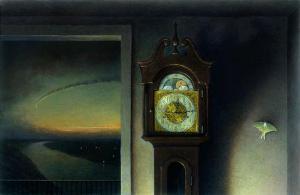Dominique Johnson is a junior at DePaul University pursuing a Religious Studies major. Dominique is on the Executive Board of DePaul Interfaith.
_
In Rex Dutta’s paper (The Secret Doctrine/Concentric Key, 1984) he explains why is English hopelessly inadequate [to express certain ideas about an unconditioned unity or a state]: “It is used by people who can’t yet go thought-to-thought direct, in silent telepathy, in full Oneness; who stay separated; and who use second-hand “thought” to try and guess what others mean by words/language.” (cf. Symposium on H.P. Blavatsky’s Secret Doctrine, p. 11)
Says Morya: (We are) “accustomed to rather follow the thought of our interlocutor or correspondent than the words he clothes it in” (Mahatma Letters to A.P. Sinnett, Number XXIX)
I: MEMORY & DESIRE—HEIGHTENED-AWARENESS BRINGS ABOUT A DIFFERENT INTELLIGENCE
The boy was sitting at the desk, attending to the clear skies, pleasantries in a dish bowl; and cooling to the summer breeze, and that breeze whispering to the coming fall season. He had three hours to sit at the front desk … “What will I do?” he said. So, he began reading, but the breeze coming through the side doors reminded him to listen attentively, and without effort — just listen …. Now, he listens to the sound of the antique clock’s pendulum swinging in motion …. Like that pendulum, the human being daily drifts in and out between two states: being that of the past and the future. And we will try to discover how problematic it is, though such a state can be useful for practical purposes.
Now, one is attending closely to the wind blow, the crackling of a paper wrap, then the candy rolling across the lips, exciting the senses, when it meets the taste-buds. The senses become excited, and there’s this almost irrepressible desire for sweet taste to be quenched like a fire-place has been drenched with water. Can one be aware of that entire process unfolding? Can you silently observe of the urge that tempts you? If one wants to learn what desire is, and if in what way is it problematic, one must be alert. From when the brain has decided to turn the chair and attends the hands to the candy-jar, as a reaction to sense-desires — because certainly one must haven’t eaten breakfast since waking up — is it possible that one can be aware of that whole process unfolding?
Say, one has experience of the past, stored in memory, of the taste of something the senses has registered as sweet, pleasing. A past experience of tasting something sweet feeds the senses, when the past memory of experiencing it as pleasing is invoked. Either one has the immediate urge, signaled by the brain and body to please or quench slight hunger, or one can be aware of that whole process. Then, of course one could take the treat, and turn the chair towards the summer breeze and enjoy, but consciously! Does one think that intellect, with its capacity, which is limited is able to perceive all that? What aspect of our inmost self perceives such a process? Being aware of that whole process, and the inner processes of the mind, brings about a different intelligence that brings about order, harmony, peace — in a mind that is: disorderly, in conflict, or enclosed from the world, cultivated, deeply conditioned; and being those things unable to perceive without the screens placed upon it by external influences. Do we know the sources of our consciousness, which mind uses to relate and interact with the world?
II: IS THE ‘PERSONAL EGO’ APART OF THIS?—WHAT OF US PERCEIVES STATES OF NO-TIME?
When the pendulum swings, and one is not constantly shifting between past and future, where is the conditioned and personal I or the “me” bound by time and space? Might there be a higher aspect to our being, that serves as a medium between the personal ‘I’ and most abstract part of mind; there’s still another ‘I’ observing over that personal ‘I’. What of us perceives states of no-time when the personal ‘I’ is not there?! Might it be our impersonal inmost self seeking to know itself? Does one begin to be aware that the mind becomes extraordinarily alert when observing the actuality of things? Is there, in that state of clarity a distinction between subject and object, the experience and the experiencer? Like dually perceiving wind blowing or pendulums of an antique clock swinging in motion and the sense of a separate ‘I’ (lower mind or personal ego) perceiving it. In order to know there’s a distinction between subject (personal I) & an object of focus, there has to be a ‘I’ THINKING incessantly about it, conceptualizing the object, naming & identifying it.
In order to know whether there’s past (a time you were comfortably in your bed, not working) and a future (waiting for break), you have to THINK. And so, our perception reflects our position in those two extremities, which dulls perception. A dull lense, dulls light. So, when the clock-hand reaches the 12 P.M. mark, and the bell rings loudly, first comes thought, out of memory; thus, in this case, a past memory reminds ‘I’ that once the bell has rung, front-desk duty is over, and it’s time for lunch! Thoughts surface and rush, ex: ‘I wonder what’s for lunch today, yesterday’s was good? The personal ‘I’ immediately surfaces with thought, when the distinction of subject and object arise. Now, the mind is no longer attentive to all those sounds, or in complete awe of the clouds above the birds flying in rows — in harmonious sequence, because the prospect of eating that meal has usurped conscious-attention in a state where time is naught, and so insight becomes dulled!
